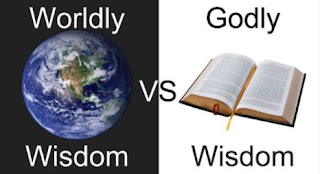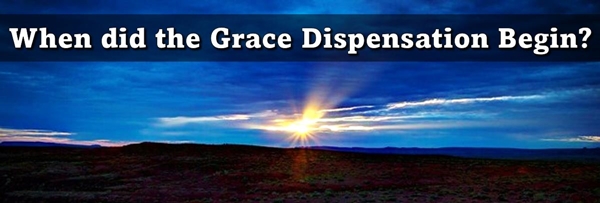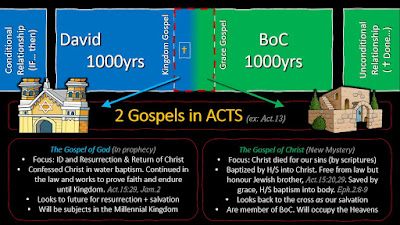Limit your Exposure to Worldly Wisdom
Limit your Exposure |  |
There is nothing wrong with Bible study, even intense study, in order to really get to the fullness of a topic and extract everything of value from it. However, as with anything, you have to stay in balance, not only with your time and energy, but also with the materials that you use during you research and the places you go to in order to collect that data.
The Bible foretells in Daniel, that in the last days, "knowledge will increase" (Dan.12:4). I believe this 'knowledge' will be the vast resources like the internet, books, and videos at our disposal. We can collect vast arrays of material from multiple sources quickly and easily today, but the more material you have for your studies, the more it will contribute to different opinions and interpretations. I can speak from experience when I say that it can get confusing and one can unknowingly slip off the track of truth when you get engulfed by too much content.
The bible is the ONLY source of truth! All other materials are interpretations of that truth. Some interpretations might be accurate, some might not, some might be biased and become false teachings. It becomes important to weigh up the material with the Bible and eliminate content that disregards scripture or that clearly misinterprets scripture. A rule of thumb is that "scripture must interpret scripture"; in other words, that a fact must be accurately confirmed by multiple other scriptures. If a fact is based on only one verse and clearly disregards or violates other scriptures, that fact is probably an opinion or a false (or biased) interpretation by the author. It is imperative that one keeps this in mind as you read, study, and apply what you've learned into your life or writings or teachings.
One last piece of advice I'd like to mention is that your study must line up with the right dividing of scripture according to Paul's instruction in 1 Timothy 2:15. Even if your content is drawn exclusively from the Bible (without other contributing sources), your study can still result in a skewed interpretation if you do not understand and practice interpreting the scriptures in a dispensational way. The multitude of denominations and theologies out there are the direct result of people disregarding this critical practice of rightly dividing the Word of truth.
This article is not to discourage you from studying the bible. Certainly not! I want to encourage and promote it with ALL my heart. As a matter of fact, if you study the Word from a dispensational view, you will discover such a vast amount of truths; gems and revelations that you may have missed before, and so much inspiration that you will not be able to lay the Bible down. I have been there and can truthfully testify to this!!!
I encourage you to read Shawn's discourse below, which confirms the point I raise, and then I also would like to point you to a key article I have posted called: To Cut Straight, to Handle Aright. This article will guide you through a dispensational view of the Bible, indicating the vast difference between Paul's doctrine and that of the 'Israel program'. It will help you to understand how to rightly divide the Word of truth.
God bless.
This is a verbatim quote from a longer article by Shawn Brasseaux.
It's an excellent article Shawn, and I particularly like, and want to emphasize, the following part of your study on my blog. Thanks for your sound advice!
----------------
King Solomon expressed his frustration in Ecclesiastes 12:12: "And further, by these, my son, be admonished: of making many books there is no end; and much study is a weariness of the flesh." The entire Book of Ecclesiastes is a record of how Solomon dabbled in a variety of philosophical observations and speculations. He had investigated the world through human (fleshly) eyes. Solomon sought happiness and fulfillment in all kinds of places. Upon the conclusion of his experiment, he wound up thoroughly disoriented and utterly disappointed. He witnessed events he wished he had not. Solomon got involved with all sorts of temporary pleasures—only to end up completely confused and immensely disturbed. Wholly exhausted and immeasurably burdened, Solomon is now an old man. Having wasted his life with nonsense, he is frail and dying, attempting to reason with his son not to repeat his mistakes. Many Christians, had they learned this lesson, would not be in the spiritual mess they are currently in.
Friend, "weariness" will afflict you too if you spend too much time thinking like a lost person when you should be concentrating on the Scriptures. In today's world, so many authorities and sources of information competing with the Bible for our loyalty. There are myriads of distractions at every turn and around every corner, all vying for our attention. Here again is Satan's evil world system, attempting to seduce us as it did Solomon 3,000 years ago. We must be on guard, or our edification will be ruined. Be careful!
When this life is over, the average Christian will have squandered years upon years—yea, decades upon decades—watching television, surfing the internet, gossiping on the telephone, reading theology books, and so on, when they could have been studying their Bible. Their inner man will be so polluted with spiritual garbage. Ignorant of the things of God, they will be experts in conspiracy theories, rumors, opinions, speculations, amusement, hunches, and so on. Hopefully, dear Christian friend, you will not be one of these miserable souls! You may not realize it now, but it will greatly help you if you heed these warnings. One day, you will look back on this and be so thankful that you paid attention here.



Comments
Post a Comment